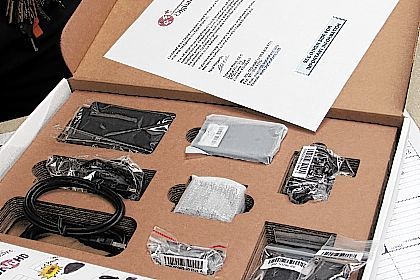
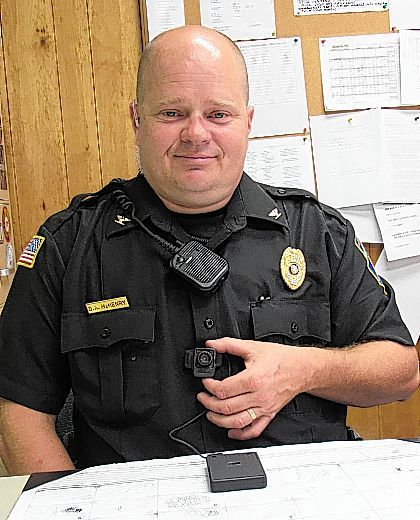
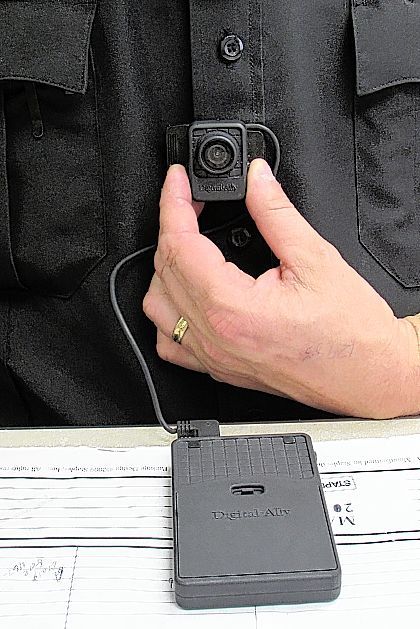
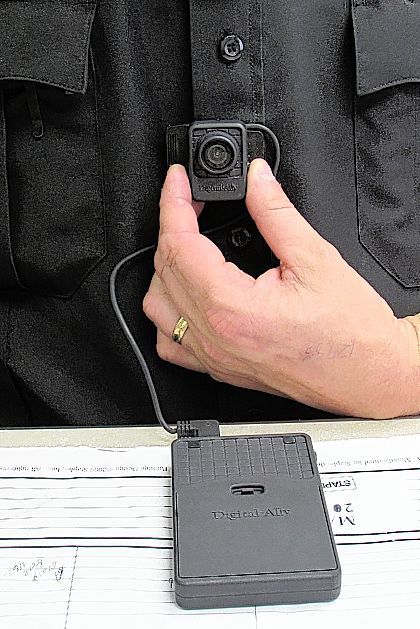
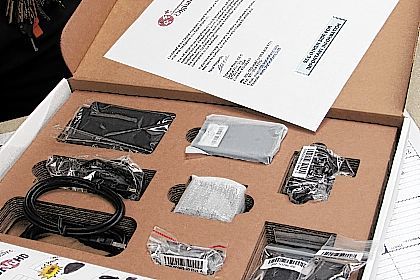
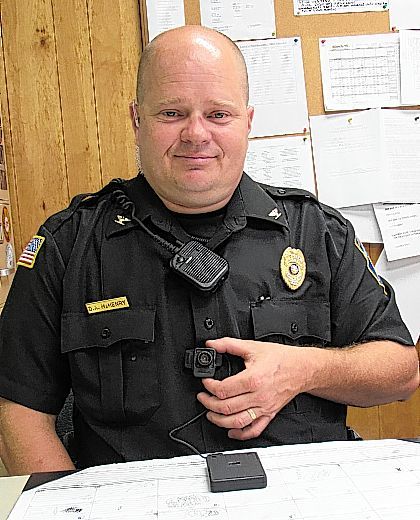
By Rachel Lloyd
UNION CITY, Ohio — It seems as if every day the media is covering a new case of a police officer accused of wrongdoing and a whole lot of people on both sides crying out about who was right and who was wrong.
Many of those cases would be indisputable for one side or the other if only they had been fully documented with video and audio. For this reason, more and more people are advocating for police to wear bodycams.
Legislators have been bandying about the idea of making bodycams mandatory for law enforcement, but one local police department is already a step ahead.
Union City (Ohio) Police Department has just become the first law enforcement agency in the county to add bodycams to its officers’ standard equipment.
“The previous administration was already looking into bodycams when I came in,” UCO Police Chief David McHenry said Thursday. “But a lot has happened in the nation and the media since then. So when I took over in February, one of the first things I did was I started researching into the bodycams.”
McHenry looked at all the options and determined the best choice to be Digital Ally, which is the same company UCOPD uses for its in-car cameras. He then went to Darke County Prosecutor R. Kelly Ormsby and asked if his office would be able to help cover the cost.
Ormsby agreed to cover half the cost, and as soon as the purchase order was approved through the village council for the other half, the order went in. The department now has four body cameras that will be used by every officer on duty during every shift.
Because the units are from the same company as the in-car cameras, the two are integrated into the same system.
McHenry explained that the squad cars have been equipped with a sensor, so as soon as the lightbar on the car is activated, both the in-car camera and the body camera worn by the officer automatically turn on with both video and audio. The officer then must manually turn the units off when the scene is clear.
“It’s one less thing our officers have to think about when they’re in a stressful situation,” McHenry said. “I don’t want them to have to think, ‘OK, did I turn my camera on?’”
The units also can be turned on manually for when the officer is on foot.
The small body camera is clipped to the officer’s uniform and the attached hard drive/power pack is carried in a pocket. At the end of each shift, McHenry said, the unit is connected to the department’s server and uploaded, where it cannot be altered by anyone in any way.
McHenry said he was not motivated by a concern that bodycams might soon be mandated; he was looking for another way to further protect his officers.
“I could see they were becoming increasingly needed because of the false allegations that have been coming about law enforcement,” McHenry said. “We’re just trying to do a tough job in a tough time, and we have to protect ourselves.”
The chief said the department has been using a demonstation unit for a couple of months, and it has already proven his point.
“I’ve had one incident where a lady was going to file a complaint against an officer but when she realized that the whole entire conversation and everything was videotaped with the body camera, she no longer wanted to do that,” McHenry said. “Usually that is an indication that somebody was just mad because they got arrested and they were going to try to get the officer back because of their misfortune.”
Just the awareness that a camera is recording an entire encounter can help to defuse a situation before it becomes volatile.
“Not only is it going to hold my officers to a higher standard, but it’s also going to hold the public to a higher standard,” McHenry said.
Ormsby agreed.
“The great majority of the time, I think it’s going to show that the officer was in the right,” Ormsby said. “I mean occasionally, obviously, if an officer makes a mistakes it’s going to show that, too. The main thing is that we’re supposed to be trying to find out what the truth of the matter is.”
Ormsby was so sold on McHenry’s plan that he not only offered to pay half for Union City, he extended that offer to every other law enforcement agency in the county.
“I think it’s going to be mandatory sooner or later that the government — either at the federal level or the state level — is going to say that officers have to have bodycams to verify what they did, and in general, that’s going to be good, especially if you’ve got a horrible situation like a homicide and you’ve got two grossly different versions of what people are saying happened.”
Ormsby said his office has some funds that can be used for law enforcement purposes, and he thought equipping officers with bodycams was a worthwhile use for that money, particularly in light of recent situations such as the shooting death of 18-year-old Michael Brown by a police officer, Darren Wilson, in Ferguson, Missouri, and the incident’s surrounding controversy regarding what exactly occurred.
“When UCPD asked me about (help to pay for the bodycams) I thought, ‘Yeah, I can help you with that, and with all the other stuff that’s going on, I’m going to extend that offer to the other departments as well,” Ormsby said.
Ormsby said a few other departments are currently looking into equipping themselves with body cameras, as well.




